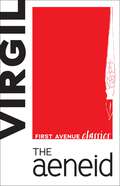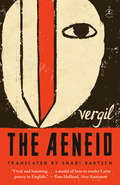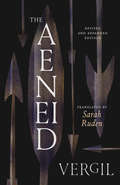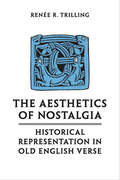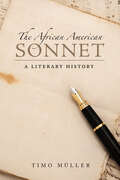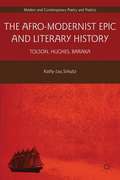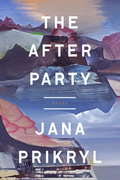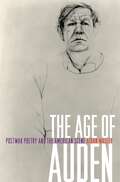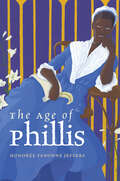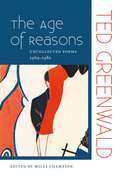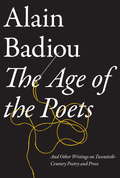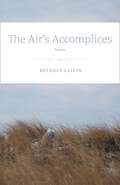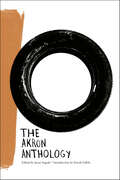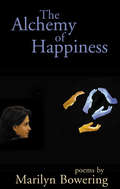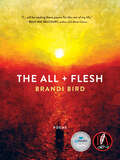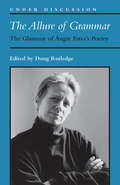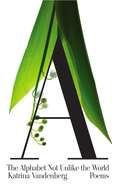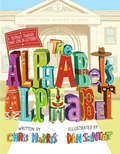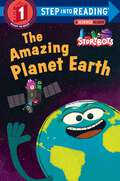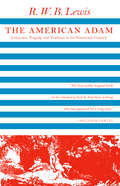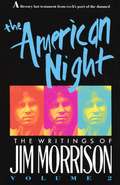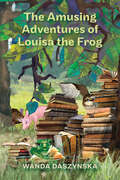- Table View
- List View
The Aeneid: Selected And Arranged With Brief Notes (classic Reprint) (First Avenue Classics ™)
by VirgilAeneas—the son of a human and Venus, the goddess of love—escapes the siege of Troy with a boat full of other Trojans, and sails for Italy where he is destined to found the city of Rome. A storm diverts them to Carthage, where Aeneas meets Dido, the city’s ruler and queen. He recounts the tale of his dangerous journey across the Mediterranean to her, and the two fall in love. After the gods remind Aeneas that it is his fate to start a new city, he sails for Italy, leaving a devastated Dido behind. The Italians are at first friendly, but when war breaks out, Aeneas must fight to fulfill his destiny. Virgil originally wrote his epic poem, The Aeneid, in Latin around 20 BCE. This is an unabridged version of the English translation by John Dryden, first published in 1697.
The Aeneid: Translated By Shadi Bartsch (Barnes And Noble Classics Ser.)
by Virgil VergilA fresh and faithful translation of Vergil&’s Aeneid restores the epic&’s spare language and fast pace and sheds new light on one of the cornerstone narratives of Western culture.&“The best version of the Aeneid in modern English: concise, readable and beautiful, but also as accurate and faithful to Vergil&’s Latin as possible.&”—James J. O&’Hara, George L. Paddison Professor of Latin, University of North Carolina at Chapel HillFor two thousand years, the epic tale of Aeneas&’s dramatic flight from Troy, his doomed love affair with Dido, his descent into the underworld, and the bloody story behind the establishment of Rome has electrified audiences around the world. In Vergil&’s telling, Aeneas&’s heroic journey not only gave Romans and Italians a thrilling origin story, it established many of the fundamental themes of Western life and literature—the role of duty and self-sacrifice, the place of love and passion in human life, the relationship between art and violence, the tension between immigrant and indigenous people, and the way new foundations are so often built upon the wreckage of those who came before. Throughout the course of Western history, the Aeneid has affirmed our best and worst intentions and forced us to confront our deepest contradictions.Shadi Bartsch, Guggenheim Laureate, award-winning translator, and chaired professor at the University of Chicago, confronts the contradictions inherent in the text itself, illuminating the epic&’s subversive approach to storytelling. Even as Vergil writes the foundation myth for Rome, he seems to comment on this tendency to mythologize our heroes and societies, and to gesture to the stories that get lost in the mythmaking. Bartsch&’s groundbreaking translation, brilliantly maintaining the brisk pace of Vergil&’s Latin even as it offers readers a metrical line-by-line translation, provides a literary and historical context to make the Aeneid resonant for a new generation of readers.
The Aeneid: Translated By Shadi Bartsch (The\focus Classical Library)
by VergilA powerful and poignant translation of Vergil&’s epic poem, newly equipped with introduction and notes This is a substantial revision of Sarah Ruden&’s celebrated 2008 translation of Vergil&’s Aeneid, which was acclaimed by Garry Wills as &“the first translation since Dryden&’s that can be read as a great English poem in itself.&” Ruden&’s line-for-line translation in iambic pentameter is an astonishing feat, unique among modern translations. Her revisions to the translation render the poetry more spare and muscular than her previous version and capture even more closely the essence of Vergil&’s poem, which pits national destiny against the fates of individuals, and which resonates deeply in our own time. This distinguished translation, now equipped with introduction, notes, and glossary by leading Vergil scholar Susanna Braund, allows modern readers to experience for themselves the timeless power of Vergil&’s masterpiece. Praise for the First Edition: &“Fast, clean, and clear, sometimes terribly clever, and often strikingly beautiful. . . . Many human achievements deserve our praise, and this excellent translation is certainly one of them.&”—Richard Garner, The New Criterion &“Toning down the magniloquence, Sarah Ruden gives us an Aeneid more intimate in tone and soberer in measure than we are used to—a gift for which many will be grateful.&”—J. M. Coetzee &“An intimate rendering of great emotional force and purity. . . . The immediacy, beauty, and timelessness of the original Latin masterpiece lift off these pages with gem-like originality.&”—Choice
The Aesthetics of Nostalgia: Historical Representation in Old English Verse
by Renee R. TrillingHeroic poetry was central to the construction of Anglo-Saxon values, beliefs, and community identity and its subject matter is often analyzed as a window into Anglo-Saxon life. However, these poems are works of art as well as vehicles for ideology. Aesthetics of Nostalgia reads Anglo-Saxon historical verse in terms of how its aesthetic form interacted with the culture and politics of the period. Examining the distinctive poetic techniques found in vernacular historic poetry, Renée R. Trilling argues that the literary construction of heroic poetry promoted specific kinds of historical understanding in early medieval England, distinct from linear and teleological perceptions of the past. The Aesthetics of Nostalgia surveys Anglo-Saxon literary culture from the age of Bede to the decades following the Norman Conquest in order to explore its cultural impact through both its content and its form.
The African American Sonnet: A Literary History (Margaret Walker Alexander Series in African American Studies)
by Timo MüllerSome of the best known African American poems are sonnets: Claude McKay's "If We Must Die," Countee Cullen's "Yet Do I Marvel," Gwendolyn Brooks's "First fight. Then fiddle." Yet few readers realize that these poems are part of a rich tradition that formed after the Civil War and comprises more than a thousand sonnets by African American poets. Paul Laurence Dunbar, Jean Toomer, Langston Hughes, Margaret Walker, and Rita Dove all wrote sonnets.Based on extensive archival research, The African American Sonnet: A Literary History traces this forgotten tradition from the nineteenth century to the present. Timo Müller uses sonnets to open up fresh perspectives on African American literary history. He examines the struggle over the legacy of the Civil War, the trajectories of Harlem Renaissance protest, the tensions between folk art and transnational perspectives in the thirties, the vernacular modernism of the postwar period, the cultural nationalism of the Black Arts movement, and disruptive strategies of recent experimental poetry.In this book, Müller examines the inventive strategies African American poets devised to occupy and reshape a form overwhelmingly associated with Europe. In the tightly circumscribed space of sonnets, these poets mounted evocative challenges to the discursive and material boundaries they confronted.
The African Prayer Book
by Desmond TutuThis book contains a collection of prayers from a variety of traditions in Africa. They are organized according to category or usage--devotional, hymns, etc.--and their sources range from African folk poems to prayers from Church fathers such as St. Augustine.
The Afro-modernist Epic And Literary History
by Kathy Lou SchultzAnalyzing the poets Melvin B. Tolson, Langston Hughes, and Amiri Baraka, this study charts the Afro-Modernist epic. Within the context of Classical epic traditions, early 20th-century American modernist long poems, and the griot traditions of West Africa, Schultz reveals diasporic consciousness in the representation of African American identities.
The After Party: Poems
by Jana Prikryl"A truly moving book." --John AshberyJana Prikryl's The After Party journeys across borders and eras, from cold war Central Europe to present-day New York City, from ancient Rome to New World suburbs, constantly testing the lingua francas we negotiate to know ourselves. These poems disclose the tensions in our inherited identities and showcase Prikryl's ambitious experimentation with style."Thirty Thousand Islands," the second half of the collection, presents some forty linked poems that incorporate numerous voices. Rooted in one place that fragments into many places--the remote shores of Lake Huron in Canada, a region with no natural resources aside from its beauty--these poems are an elegy that speaks beyond grief.Penetrating, vital, and visionary, The After Party marks the arrival of an extraordinary new talent.From the Trade Paperback edition.
The Age of Auden: Postwar Poetry and the American Scene
by Aidan WasleyHow W. H. Auden’s emigration to the United States changed the course of postwar American poetryW. H. Auden's emigration from England to the United States in 1939 marked more than a turning point in his own life and work—it changed the course of American poetry itself. The Age of Auden takes, for the first time, the full measure of Auden's influence on American poetry. Combining a broad survey of Auden's midcentury U.S. cultural presence with an account of his dramatic impact on a wide range of younger American poets—from Allen Ginsberg to Sylvia Plath—the book offers a new history of postwar American poetry.For Auden, facing private crisis and global catastrophe, moving to the United States became, in the famous words of his first American poem, a new "way of happening." But his redefinition of his work had a significance that was felt far beyond the pages of his own books. Aidan Wasley shows how Auden's signal role in the work and lives of an entire younger generation of American poets challenges conventional literary histories that place Auden outside the American poetic tradition. In making his case, Wasley pays special attention to three of Auden's most distinguished American inheritors, presenting major new readings of James Merrill, John Ashbery, and Adrienne Rich. The result is a persuasive and compelling demonstration of a novel claim: In order to understand modern American poetry, we need to understand Auden's central place within it.
The Age of Phillis (Wesleyan Poetry Series)
by Honorée Fanonne Jeffers&“An arresting and meticulously researched collection of poems&” about the life of Phillis Wheatley, the first black woman to publish a book in America (Ms. Magazine). In 1773, a young African American woman named Phillis Wheatley published a book of poetry, Poems on various Subjects, Religious and Moral (1773). When Wheatley&’s book appeared, her words would challenge Western prejudices about African and female intellectual capabilities. Her words would astound many and irritate others, but one thing was clear: This young woman was extraordinary. Based on fifteen years of archival research, The Age of Phillis, by award-winning writer Honorée Fanonne Jeffers, imagines the life and times of Wheatley: her childhood with her parents in the Gambia, West Africa, her life with her white American owners, her friendship with Obour Tanner, her marriage to the enigmatic John Peters, and her untimely death at the age of about thirty-three. Woven throughout are poems about Wheatley's &“age&”—the era that encompassed political, philosophical, and religious upheaval, as well as the transatlantic slave trade. For the first time in verse, Wheatley&’s relationship to black people and their individual &“mercies&” is foregrounded, and here we see her as not simply a racial or literary symbol, but a human being who lived and loved while making her indelible mark on history.
The Age of Reasons: Uncollected Poems 1969–1982
by Ted GreenwaldThis collection of Ted Greenwald's poetry, edited by Miles Champion, is a sampler of some of Greenwald's most breathtaking work. A New York poet with close ties to the New York School and the Language poets, Greenwald has written daily since the early 1960s, and none of the poems in this book are included in any of his books to date. These discrete works were written in advance of or alongside the extended explorations of a mutated triolet form that increasingly occupied him from the late 1970s on. This book can be seen as a companion to Common Sense, and provides further evidence of Greenwald's ability to think with his ear, to hear what's said as it arrives as a fresh sound or shape in his head. This work is singular in its pattern-making, its music-making, and its ability to simultaneously follow multiple paths. An online reader's companion will be available at tedgreenwald.site.wesleyan.edu
The Age of the Poets
by Emily Apter Bruno Bosteels Alain BadiouThe Age of the Poets revisits the age-old problem of the relation between literature and philosophy, arguing against both Plato and Heidegger's famous arguments. Philosophy neither has to ban the poets from the republic nor abdicate its own powers to the sole benefit of poetry or art. Instead, it must declare the end of what Badiou names the "age of the poets," which stretches from Hölderlin to Celan. Drawing on ideas from his first publication on the subject, "The Autonomy of the Aesthetic Process," Badiou offers an illuminating set of readings of contemporary French prose writers, giving us fascinating insights into the theory of the novel while also accounting for the specific position of literature between science and ideology.From the Trade Paperback edition.
The Air Show
by Peter ScuphamPeter Scupham's new collection brings together the themes of childhood and war. For the poet, a child during World War II, the two themes naturally coincide, as rumors of war, air raids, and rationing pervade his memories of boyhood.
The Air's Accomplices: Poems
by Brendan GalvinBRENDAN GALVIN is the author of sixteen poetry books, including eight published by LSU Press, of which Habitat (2005) was a finalist for the National Book Award. He has received many other honors, including the O. B. Hardison Prize from the Folger Shakespeare Library. He lives in Truro, Massachusetts.The Air's Accomplices vividly evokes poet Brendan Galvin's love for the rugged landscapes of Cape Cod and Ireland and their elusive inhabitants. Weaving themes of death, migration, and aging into an exploration of the natural world, Galvin's work reflects a deep engagement with the places he and his family have called home, as well as with the triumphs and tragedies of human life. The collection begins by examining the vagaries of age, as Galvin ponders his role as caretaker for his wife following her stroke. It then moves into remembrances of walks on the beaches of Cape Cod, encounters with land and sea animals, and observations of the Atlantic Ocean's calm and violence. Other poems commemorate Galvin's Irish heritage and the emigration of family and friends from Donegal to the suburbs of his native Massachusetts. Whether eulogizing a deceased pet or capturing the flight of a seabird, The Air's Accomplices reveals a keen sense of observation and empathy for all living things.
The Akron Anthology (Belt City Anthologies)
by David Giffels Jason Segedy Joanna RichardsAn evocative collection of essays, poetry, photography and more from some of Akron, Ohio&’s best authors, artists, and activists. Between 1910 and 1920, Akron, Ohio, tripled in size, making it the fastest growing city in the United States. Its period of rapid growth coincided with the expansion of the rubber and tire industry, which in turn corresponded with the automobile boom. But since the mid-1970s, industry has abandoned Akron, and the city has lost thirty-one percent of its population. Once-opulent neighborhoods are now swaths of abandoned homes, and the factories that made Akron the Rubber Capital of the World lie dormant. Edited by Jason Segedy, and bringing together established writers like Rita Dove and David Giffels with the work of emerging voices, The Akron Anthology collects essays, poems, and photographs from the writers, artists, and activists who call Akron home. Here you&’ll find stories that include: The diaries of a doorman The trials and triumphs of refugees who have relocated to the city A portrait of Jamie Stillman, world-renowned effects pedal manufacturer Archie the talking snowman.
The Alchemy of Happiness
by Marilyn BoweringIn her new volume of verse, Bowering continues her rigorous, ambitious path and delivers poems that blend a variety of personalities, times, and places that add up to an overall substance she sees as happiness. Like an alchemist of old, she transmutes experiences, perceptions, and perspectives into something richer and rarer despite the passage of years and the loss and death they have brought.
The Aliens Have Landed!
by Kenn NesbittFrom the back cover: If aliens ever visit Earth, they'll definitely want to take this book home with them. No other souvenir will do after they've seen the world through Kenn Nesbitt's eyes-a world full of mashed potatoes on the ceiling, kangaruplets, skunks in love, antigravity machines, and a jillion other imaginative subjects. No matter what planet you live on, you'll want this book, too . . . it's packed with far-out, funny, clever poems guaranteed to give you a galactic case of the giggles.
The All + Flesh: Poems
by Brandi BirdBrandi Bird's frank, transcendent poetry explores the concepts of health, language, place, and memory in this long-anticipated debut collection. Brandi Bird’s long-anticipated debut poetry collection, The All + Flesh, explores the concepts of health, language, place, and memory that connect its author to their chosen kin, blood relatives, and ancestral lands. By examining kinship in broader contexts, these frank, transcendent poems expose binaries that exist inside those relationships, then inspect and tease them apart in the hope of moving toward decolonial future(s). Bird’s work is highly concerned with how outer and inner landscapes move and change within the confines of the English language, particularly the “I” of the self, a tradition of movement that has been lost for many who don’t speak their Indigenous languages or live on their homelands. By exploring the landscapes the poet does inhabit, both internally and externally, Bird’s poems seek to delve into and reflect their cultural lineages—specifically Saulteaux, Cree, and Métis—and how these transformative identities shape the person they are today. I am made of centuries & carbohydrates the development of my molars the hunger the teeth grew has been with me since childhood I can’t escape the mouths of others
The Allure of Grammar: The Glamour of Angie Estes's Poetry (Under Discussion)
by Douglas R RutledgeOf Angie Estes, the poet and critic Stephanie Burt has written that she “has created some of the most beautiful verbal objects in the world.” In The Allure of Grammar, Doug Rutledge gathers insightful responses to the full range of Estes’s work—from a review of her first chapbook to a reading of a poem appearing in her 2018 book, Parole—that approach these beautiful verbal objects with both intellectual rigor and genuine awe. In addition to presenting an overview of critical reactions to Estes’s oeuvre, reviews by Langdon Hammer, Julianne Buchsbaum, and Christopher Spaide also provide a helpful context for approaching a poet who claims to distrust narrative. Original essays consider the craft of Estes’s poetry and offer literary analysis. Ahren Warner uses line breaks to explore a postmodern analysis of Estes’s work. Mark Irwin looks at her poetic structure. Lee Upton employs a feminist perspective to explore Estes’s use of italics, and B. K. Fischer looks at the way she uses dance as a poetic image. Doug Rutledge considers her relationship to Dante and to the literary tradition through her use of ekphrasis. An interview with Estes herself, in which she speaks of a poem as an “arranged place . . . where experience happens,” adds her perspective to the mix, at turns resonating with and challenging her critics. The Allure of Grammar will be useful for teachers and students of creative writing interested in the craft of non-narrative poetry. Readers of contemporary poetry who already admire Estes will find this collection insightful, while those not yet familiar with her work will come away from these essays eager to seek out her books.
The Alphabet Not Unlike the World
by Katrina VandenbergIn her accomplished second collection of poems, Katrina Vandenberg writes from the intersection of power and forgiveness. With poems named for letters of the Phoenician alphabet, and employing such innovative forms as the ancient ghazal, Vandenberg deciphers the seemingly indecipherable in this extraordinary becoming of self through language. Moving between the physical and the abstract, the individual and the collective, Alphabet Not Unlike the World unearths meaning-with astonishing beauty-from the pain of loss and separation."A deeply confident, compelling voice, with strong music, originality, and flow. I wanted to go wherever it went. Passionate with a keen sense of surprise, these poems are funny, serious, and wise all at once. Bravo." -Naomi Shihab Nye
The Alphabet's Alphabet
by Chris HarrisFor fans of P is for Pterodactyl comes this groundbreaking spin on the ABCs from an acclaimed bestselling author and artist duo!Here's a totally twisted take on the alphabet that invites readers to look at it in a whole new way: An A is an H that just won't stand up right, a B is a D with its belt on too tight, and a Z is an L in a tug-of-war fight! Twenty-six letters, unique from each other -- and yet, every letter looks just like one another! Kind of like...one big family.From two bestselling masters of wordplay and visual high jinks comes a mind-bending riddle of delightful doppelgängers and surprising disguises that reveal we're more alike than we may think. You'll never look at the alphabet the same way again!
The Amazing Planet Earth (Step into Reading)
by StorybotsThe wacky robots from the award-winning apps, videos, and Netflix show, Ask the StoryBots, now star in their own early readers. This one is about our little corner of the solar system!Fans of the StoryBots will recognize the colorful art from their popular outer-space video, &“A Beautiful, Beautiful World&” (The Earth Song), on YouTube. There are eight planets in our solar system, but the most beautiful is the one we call home. This rhyming Step 1 Science Reader will entertain while imparting simple facts about everyone&’s favorite planet. Step 1 Readers feature big type and easy words for children who know the alphabet and are eager to begin reading. Rhyme and rhythmic text paired with picture clues help children decode the story.Accolades for the StoryBots digital media: Appy Award for Best Book AppTeacher's Choice Award Editor&’s Choice—Children&’s Technology Review Family Choice Award Parents&’ Choice AwardCynopsis Kids !magination Award for best educational mobile app
The American Adam: Innocence, Tragedy, and Tradition in the Nineteenth
by R.W.B. LewisIntellectual history is viewed in this book as a series of "great conversations"—dramatic dialogues in which a culture's spokesmen wrestle with the leading questions of their times. In nineteenth-century America the great argument centered about De Crèvecoeur's "new man," the American, an innocent Adam in a bright new world dissociating himself from the historic past. Mr. Lewis reveals this vital preoccupation as a pervasive, transforming ingredient of the American mind, illuminating history and theology as well as art, shaping the consciousness of lesser thinkers as fully as it shaped the giants of the age. He traces the Adamic theme in the writings of Emerson, Thoreau, Hawthorne, Melville, Henry James, and others, and in an Epilogue he exposes their continuing spirit in the works of F. Scott Fitzgerald, William Faulkner, Ralph Ellison, J. D. Salinger, and Saul Bellow.
The American Night: The Writings Of Jim Morrison
by Jim MorrisonTHE AMERICAN NIGHT presents Morrison's previously unpublished work in its truest form. With their nightmarish images, bold associative leaps, and volcanic power of emotion, these works are the unmistakable artifacts of a great, wild voice and heart.
The Amusing Adventures of Louisa the Frog
by Wanda DaszynskaThe Amusing Adventures of Louisa the Frog is made up of four stories about an enterprising little frog called Louisa, who will delight young readers. Louisa is full of ideas and her adventures are sure to be an inspiration to a great number of children.These stories have an educational aspect which is skilfully interwoven with humour. The little frog finds out that not everything can go according to plan, but there is always her dear friend Kaya the owl, who helps her to put things right.Louisa and Kaya are just two of the fascinating creatures in these stories, which are also illustrated with lovely and colourful images.
